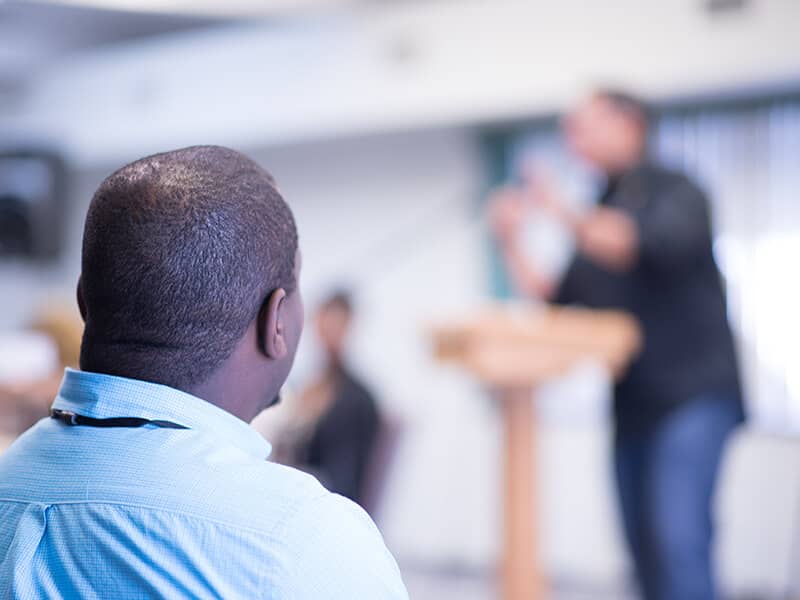It is, of course, not a new discussion, but one that goes back to the nation's founding. Those founders saw the wisdom of separating church and state, making sure there would be no state-sponsored religion in the new nation, or any state interference in the devout diversity of the citizen's religious practice. But as many in the current debate have pointed out, religion has always been a part of American politics, with continuous reference to God and faith on the part of many presidents and myriad social reformers. From Washington, Jefferson, and Lincoln, to Dwight Eisenhower, Jimmy Carter, and Ronald Reagan, to Martin Luther King Jr., Jesse Jackson, and Pat Robertson, the language of faith has been repeatedly invoked for a variety of social and political purposes.
At its best, faith in God has been used to hold the nation to divine accountability, as in Lincoln's expressions of collective penitence and need for national forgiveness and King's calling his country to its best religious and political ideals in his "Letter From the Birmingham Jail." But at its worst, biblical proof-texting to support ideological causes has made both religion and politics look bad. Are we on God's side? has always been a better question than Is God on ours?
Religion has and will always be a part of American politics. I would argue that the real question is not whether religious values should help shape our national political discussion, but how.
Much talk about faith and politics has focused on the religious fundamentalists of the Christian right. But today, there are new fundamentalists in the land. These are the "secular fundamentalists," many of whom attacked Lieberman for his open religious affirmations. From the Anti-Defamation League, to Americans United for the Separation of Church and State, to the ACLU, to some of the left's religion-fearing ideologues, a cry of alarm has gone up in response to a Jewish vice-presidential candidate who has the audacity to be religious in public. The Anti-Defamation League even had the amazing lapse of historical memory to suggest that religious language in politics was contrary to the "American ideal." The truth is just the opposite. Indeed, many of the most progressive social movements in American history had overt religious roots and motivations, from the abolition of slavery to women's suffrage, to the fight for child labor laws to the civil rights movement.
I'd like to ask why so many liberals seem supportive of religious language when it is invoked by black civil rights leaders like Martin Luther King Jr. and Jesse Jackson, but recoil when such language is employed by white political leaders of either conservative or now liberal stripes. Remember the Reverend Jackson's historic 1984 speech to the Democratic National Convention? He began by saying, "Tonight we come together bound by our faith in a mighty God...." He went on to talk about God, quote Jesus, and begin a story by saying, "The Bible teaches...." There was no criticism of that speech from progressives.
It is certainly a double standard to say that religion can be used to support voting rights but not to oppose abortion, for example. But is there a subtle kind of racism going on here, where religion is OK for liberals as long as it comes from black or poor people? Are black people supposed to be culturally religious (love those black choirs), while white believers are intellectually suspect?
The more talk about values the better in political campaigns, and as Joe Lieberman has pointed out, religion is a primary source of values for many Americans. Clearly, minority religions must always be respected and protected in our nation, as should non-religious citizens in any dialogue about religion and politics. But those core commitments of religious liberty need not be compromised by such an open discussion of faith and public life. Indeed, the kind of talk about religion and politics Lieberman has sparked in this election campaign represents, according to columnist E.J. Dionne, "not a threat to religious liberty but its triumph."
The secular fundamentalists tell us that religion should be restricted to one's church or family. No talk of faith ought to be allowed to seep into the public arena for fear of violating the First Amendment or alienating the non-religious. Perhaps we should also make sure all our church and living room windows are shut tight so that no words of faith are overheard by the wider society. Lieberman's statement that "the Constitution guarantees freedom of religion, not freedom from religion" prompted one of his most virulent critics to admit that she really did want a society free from religion. Fortunately, the Constitution protects the free speech of believing and unbelieving citizens.
The secular fundamentalists want to hide faith "under a bushel," but the gospel specifically instructs us not to do that. The purpose of biblical faith is not simply to comfort the believers, but to transform the world. And, yes, that can and must always be done in ways that both respect religious liberty and enhance democracy. As Catholic teaching says so well, religious faith should serve the common good. We believe, with practitioners like Martin Luther King Jr., that religious faith should help bend the world toward justice.

